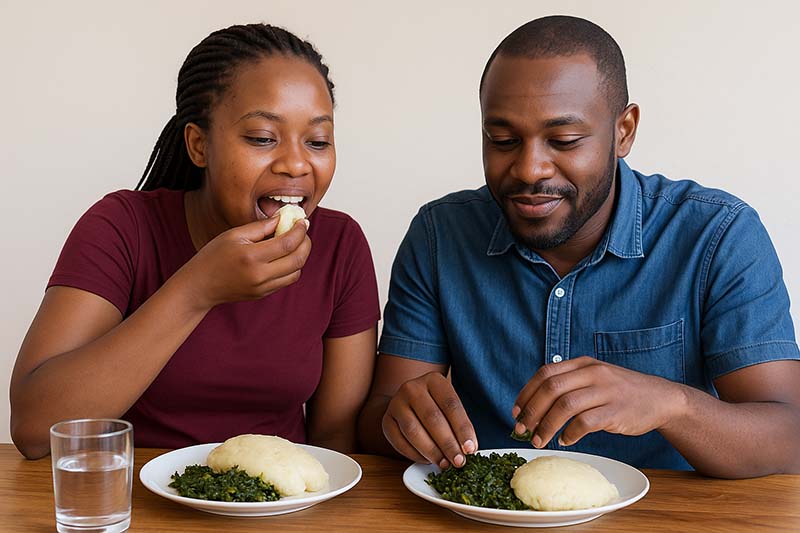In Short:
- Even with a seemingly full menu in our Kenyan diets, we lack some important nutrients from our food. These deficiencies can cause fatigue, poor immunity, and developmental issues.
- Learn easy ways to fill these gaps using local foods and smart supplementation. Our trained nutritionists are ready to help.
Click on the WhatsApp icon from any page get help.
The Kenyan diet is diverse and flavorful, built on staples like githeri, sukuma wiki, chapo, ugali and more.
But even with this variety, many Kenyans unknowingly miss out on key nutrients essential for long-term health. Nutrient deficiencies can lead to fatigue, weakened immunity, poor skin health, and even chronic diseases.
This article highlights the top nutrients commonly lacking in the Kenyan diet—and how you can fill those gaps with simple food choices and strategic supplementation.
1. Iron
Why it’s important: Iron helps your body make red blood cells and carry oxygen. Deficiency can cause fatigue, dizziness, and anemia.
Why it’s lacking: Many people rely heavily on plant-based iron sources like beans, which are less easily absorbed than animal sources.
How to get more:
- Eat more red meat, liver, and sardines.
- Pair plant-based iron (like spinach, beans, or pumpkin seeds) with vitamin C-rich foods (like oranges or tomatoes) to boost absorption.
- Consider an iron supplement if you’re vegetarian, pregnant, or chronically tired.

2. Vitamin D
Why it’s important: Crucial for strong bones, immune support, and mood regulation.
Why it’s lacking: Despite plenty of sun, modern indoor lifestyles and dark skin pigmentation reduce the body's natural production of vitamin D.
How to get more:
- Expose skin to sunlight for 15–30 minutes daily.
- Eat eggs, fortified milk, and fatty fish like mackerel.
- Use a Vitamin D3 supplement (vitamins D3/K2 recommended), especially during rainy seasons or for those who work indoors.

3. Vitamin B12
Why it’s important: Vital for nerve function, red blood cell production, and energy levels.
Why it’s lacking: Found only in animal products, so vegans and some vegetarians are most at risk.
How to get more:
- Eat eggs, meat, fish, and dairy.
- If you're vegan, supplement with B12 regularly (sublingual B12 is highly effective).
4. Omega-3 Fatty Acids
Why it’s important: Supports brain function, heart health, and reduces inflammation.
Why it’s lacking: Most Kenyan diets are low in fatty fish and nuts.
How to get more:
- Eat fish like tilapia, mackerel, or sardines 2–3 times a week.
- Add chia seeds, flaxseeds, or walnuts to meals.
- Use an Omega-3 supplement (look for EPA and DHA).
5. Magnesium
Why it’s important: Helps with energy production, muscle function, and blood sugar regulation.
Why it’s lacking: Highly processed foods and depleted soils result in lower magnesium content in crops.
How to get more:
- Eat more leafy greens, beans, bananas, and avocados.
- Use magnesium glycinate or citrate supplements if you experience cramps or low energy.
6. Zinc
Why it’s important: Boosts immunity, supports wound healing, and maintains skin health.
Why it’s lacking: Maize-heavy diets and low meat consumption reduce zinc intake.
How to get more:
- Eat meat, eggs, pumpkin seeds, and whole grains.
- Supplement with zinc picolinate or gluconate for better absorption.
7. Calcium
Why it’s important: Builds strong bones and supports muscle and nerve function.
Why it’s lacking: Low dairy intake and high phytate foods (like maize and beans) reduce calcium absorption.
How to get more:
- Include milk, yogurt, sardines (with bones), or traditional leafy greens like kunde.
- Try calcium supplements if you avoid dairy (Calcium/Magnesium/Zinc highly recommended).
✅ Final Thoughts
Our traditional foods in Kenya are rich in culture, but they often fall short in key nutrients due to changing diets, soil depletion, and limited variety.
By being intentional with your food choices and considering high-quality supplements, you can protect your long-term health, energy, and wellbeing.
 Need help choosing the right supplements?
Need help choosing the right supplements?
Click on the WhatsApp icon on any page to get help from our trained nutritionists.






